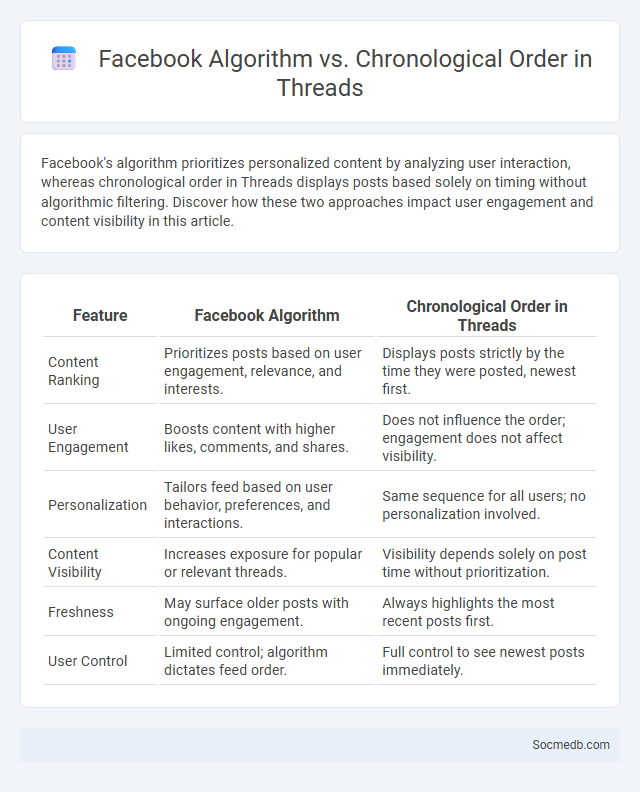
Photo illustration: Facebook Algorithm vs Chronological Order in Threads
Facebook's algorithm prioritizes personalized content by analyzing user interaction, whereas chronological order in Threads displays posts based solely on timing without algorithmic filtering. Discover how these two approaches impact user engagement and content visibility in this article.
Table of Comparison
| Feature | Facebook Algorithm | Chronological Order in Threads |
|---|---|---|
| Content Ranking | Prioritizes posts based on user engagement, relevance, and interests. | Displays posts strictly by the time they were posted, newest first. |
| User Engagement | Boosts content with higher likes, comments, and shares. | Does not influence the order; engagement does not affect visibility. |
| Personalization | Tailors feed based on user behavior, preferences, and interactions. | Same sequence for all users; no personalization involved. |
| Content Visibility | Increases exposure for popular or relevant threads. | Visibility depends solely on post time without prioritization. |
| Freshness | May surface older posts with ongoing engagement. | Always highlights the most recent posts first. |
| User Control | Limited control; algorithm dictates feed order. | Full control to see newest posts immediately. |
Understanding the Facebook Algorithm
The Facebook algorithm prioritizes content that sparks meaningful interactions between users, so posts with comments, shares, and reactions receive higher visibility. It analyzes your past behavior, preferences, and engagement patterns to tailor the News Feed specifically to your interests. Understanding this system helps you create content that resonates deeply with your audience, maximizing your reach and engagement on the platform.
How Chronological Order Works in Threads
Chronological order in social media threads organizes posts and replies by their timestamp, displaying the newest content at the bottom or top depending on the platform's design. This sequencing enables users to follow conversations in the exact order they occurred, enhancing clarity and context in discussions. Platforms like Twitter and Facebook often employ this method to maintain a coherent flow in multi-layered comment sections and real-time interactions.
Comparing Facebook Algorithm and Chronological Sorting
Facebook's algorithm prioritizes content based on user interactions, relevance, and engagement metrics, tailoring your feed to show posts most likely to interest you. In contrast, chronological sorting displays posts strictly by the time they were published, ensuring you see the latest updates without bias. Understanding these differences helps you choose how to consume social media content efficiently.
The Impact on User Engagement
Social media platforms dramatically influence user engagement by leveraging algorithms that tailor content to individual preferences, increasing time spent on apps and interaction rates. Your engagement is further enhanced through features like live streaming, stories, and instant messaging, which foster real-time communication and community building. Consistent content updates and personalized notifications motivate users to return frequently, boosting overall activity and loyalty on these platforms.
Comment Thread Structure Explained
Comment thread structure organizes user interactions by grouping replies directly under the original post or comment, creating a hierarchical flow that enhances readability and engagement. This structure allows you to follow conversations more easily, making it simpler to identify responses and participate in discussions. Understanding the layered format helps improve your interaction on platforms like Facebook, Instagram, and Reddit by maintaining context and clarity.
Differences in Content Visibility
Social media platforms differ significantly in content visibility due to their unique algorithms and user engagement metrics. For example, Facebook prioritizes content from friends and family, while Instagram emphasizes visually appealing posts and hashtag usage to enhance reach. Twitter's real-time feed exposes content through retweets and trending topics, offering dynamic visibility compared to algorithm-driven feeds on other platforms.
User Experience: Algorithm vs Chronological Threads
User experience on social media platforms is significantly influenced by the choice between algorithmic feeds and chronological threads. Algorithm-driven feeds prioritize content based on user interaction patterns, increasing engagement but potentially creating echo chambers. Chronological threads offer transparency by displaying posts in the order they were published, promoting real-time conversations and fairness in content visibility.
Advantages and Disadvantages of Each Approach
Social media platforms offer distinct advantages and disadvantages depending on your approach. For organic social media, advantages include cost-effectiveness and authentic audience engagement, while disadvantages involve slower growth and limited reach without paid promotions. Paid social media campaigns provide targeted advertising and rapid visibility, but can be expensive and sometimes lead to lower trust from your audience.
Best Practices for Content Creators
Effective social media content creators prioritize authentic engagement by understanding their audience's preferences and leveraging platform-specific algorithms to maximize reach. Consistent posting schedules combined with high-quality visuals and interactive elements like polls or Q&A sessions enhance user interaction and retention. Monitoring analytics data closely allows creators to refine strategies, optimize content performance, and stay ahead of trending topics to maintain relevancy.
Future Trends in Social Media Thread Organization
Future trends in social media thread organization emphasize enhanced algorithmic grouping and AI-powered content categorization to improve user engagement and content discoverability. Platforms are integrating machine learning to automatically cluster related posts, enabling You to follow complex discussions seamlessly and participate without missing critical updates. Expect increased use of semantic analysis and interactive thread structures that prioritize relevance and context over chronological order.
 socmedb.com
socmedb.com